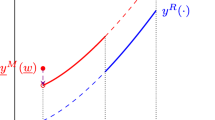Abstract
Designing a mechanism that provides a direct incentive for an individual to report her utility function over several alternatives is a difficult task. A framework for such mechanism design is the following: an individual (a decision maker) is faced with an optimization problem (e.g., maximization of expected utility), and a mechanism designer observes the decision maker’s action. The mechanism does reveal the individual’s utility truthfully if the mechanism designer, having observed the decision maker’s action, infers the decision maker’s utilities over several alternatives. This paper studies an example of such a mechanism and discusses its application to the problem of optimal social choice. Under certain simplifying assumptions about individuals’ utility functions and about how voters choose their voting strategies, this mechanism selects the alternative that maximizes Harsanyi’s social utility function and is Pareto-efficient.
Similar content being viewed by others
References
S. Brams M. Kilgour (1996) ArticleTitleBargaining procedures that induce honesty Group Decision and Negotiation 5 239–262 Occurrence Handle10.1007/BF02400946
J. Dyer R. Sarin (1979) ArticleTitleGroup preference aggregation rules based on strength of preference Management Science 25 822–832 Occurrence Handle10.1287/mnsc.25.9.822
J. Dyer R. Sarin (1982) ArticleTitleRelative risk aversion Science 28 875–886
C. Fox Y. Rottenstreich (2003) ArticleTitlePartition priming in judgment under uncertainty Psychological Science 14 195–200 Occurrence Handle10.1111/1467-9280.02431
A. Gibbard (1973) ArticleTitleManipulation of voting schemes: a general result Econometrica 41 587–601
J. Harsanyi (1955) ArticleTitleCardinal welfare, individual ethics, and interpersonal comparability of utility Journal of Political Economy 61 309–321
C. Harvey (1999) ArticleTitleAggregation of individuals’ preference intensities into social preference intensity Social Choice and Welfare 16 65–79 Occurrence Handle10.1007/s003550050131
S. Merrill (1981) ArticleTitleStrategic decisions under one-stage multi-candidate voting systems Public Choice 36 115–134 Occurrence Handle10.1007/BF00163774
D. Musto B. Yilmaz (2003) ArticleTitleTrading and voting Journal of Political Economy 111 990–1003 Occurrence Handle10.1086/377086
Y. Rottenstreich A. Tversky (1997) ArticleTitleUnpacking, repacking, and anchoring: advances in support theory Psychological Review 104 406–415 Occurrence Handle10.1037/0033-295X.104.2.406
A. Rubinstein (1989) ArticleTitleThe electronic mail game: strategic behavior under “almost common knowledge” The American Economic Review 79 385–391
Taylor, A. (2005), Social Choice and the Mathematics of Manipulation, Cambridge University Press.
A. Tversky D. Kahneman (1973) ArticleTitleAvailability: a heuristic for judging frequency and probability Cognitive Psychology 4 207–232 Occurrence Handle10.1016/0010-0285(73)90033-9
A. Tversky D. Kahneman (1974) ArticleTitleJudgment under uncertainty: heuristics and biases Science 185 1124–1131
A. Tversky D. Koehler (1994) ArticleTitleSupport theory: a nonextensional representation of subjective probability Psychological Review 101 547–567 Occurrence Handle10.1037/0033-295X.101.4.547
R. Winkler (1996) ArticleTitleScoring rules and the evaluation of Probabilities Test 5 1–60
Author information
Authors and Affiliations
Corresponding author
Rights and permissions
About this article
Cite this article
Tsetlin, I. A Method for Eliciting Utilities and its Application to Collective Choice. Theor Decis 61, 51–62 (2006). https://doi.org/10.1007/s11238-006-7191-7
Issue Date:
DOI: https://doi.org/10.1007/s11238-006-7191-7




